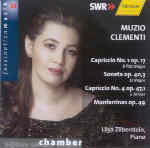Lilya Zilberstein’s Clementi recital gives the impression of a superbly schooled, proficient pianist who can play these compositions to the highest professional standards without loving the music. The B-flat Capriccio, for instance, needs more charm, elegance, and color than Zilberstein is willing to divulge. She’s less successful in the D major sonata, one of Clementi’s large-scale masterpieces. Her first-movement introduction is slow to the point of static and devoid of the drama and dynamism found in Pietro De Maria’s Naxos recording. Similarly, Zilberstein proves less secure than De Maria in the Allegro’s unforgiving runs and unison passages. While Zilberstein makes lovely sounds in the Adagio Sostenuto, the music would gain from a steadier basic pulse. The witty, Mozartean finale starts promisingly but grows slower and more monochrome as it progresses, lacking De Maria’s supple lightness and sharp contours.
You can level similar criticism vis-à-vis the three-movement E minor Capriccio, although Zilberstein admirably conveys the concluding Presto’s orchestral dimensions and agitated mood. The Op. 40 Monferrinas are less ambitious character pieces, based on popular early 19th-century dances from the Piemonte region in northwest Italy. Again, Zilberstein plays them cleanly and tastefully, but there’s often more to the music than she lets on. Do those little accelerations in No. 2 really add anything to the lilting tune? She stresses No. 4’s cross-rhythms with Schnabel-like vehemence, yet with little of that master pianist’s repose as a counterbalance. By contrast Zilberstein plays up the scampering No. 8’s uncanny resemblance to the mature Schumann, who was only 10 at the time of these compositions. Buy this disc primarily for the repertoire, but if you’re new to Clementi, first get Hänssler’s marvelous budget-priced recital with pianist Christopher Szaja Sager.
































